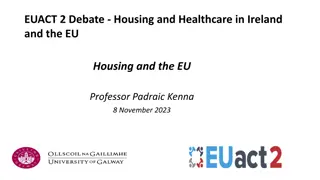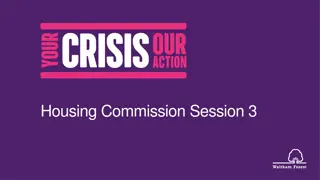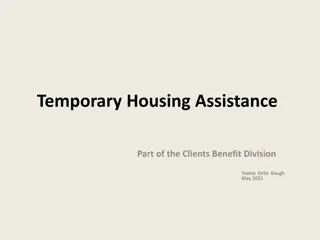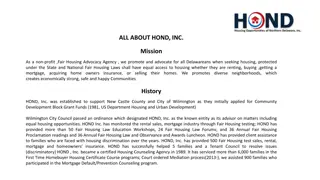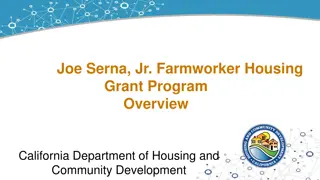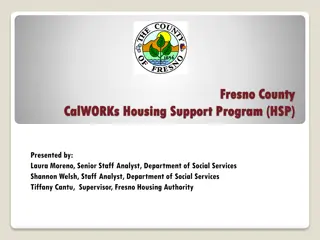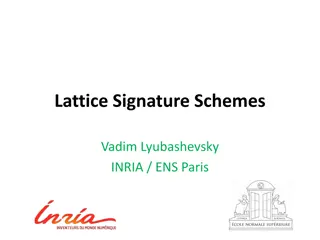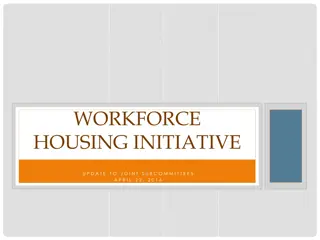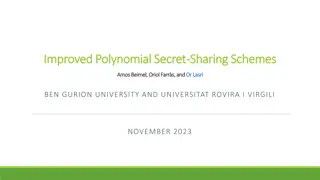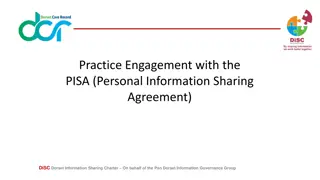Information Sharing Schemes and MARAM for Community Housing Organizations
These slides provide insights on information sharing schemes and the MARAM framework designed for community housing organizations to promote the wellbeing and safety of children, assess family violence risks, and enhance collaboration across service sectors. The Child Information Sharing Scheme (CISS) and Family Violence Information Sharing Scheme (FVISS) aim to support child welfare, address family violence risks, and improve overall child wellbeing. The presentation highlights the importance of Information Sharing Entities (ISEs) and the impact of housing stress on children's experiences and outcomes.
Download Presentation

Please find below an Image/Link to download the presentation.
The content on the website is provided AS IS for your information and personal use only. It may not be sold, licensed, or shared on other websites without obtaining consent from the author. Download presentation by click this link. If you encounter any issues during the download, it is possible that the publisher has removed the file from their server.
E N D
Presentation Transcript
INFORMATION SHARING SCHEMES AND MARAM FOR COMMUNITY HOUSING ORGANISATIONS Information in these slides is based on the Vic Gov sites: www.vic.gov.au/family-violence-multi-agency-risk- assessment-and-management and www.vic.gov.au/training-for-information-sharing-and-maram
Child Information Sharing Scheme (CISS) Information sharing schemes and MARAM reforms Family Violence Information Sharing Scheme (FVISS) Family Violence Multi Agency Risk Assessment and Management Framework (MARAM)
AIMS What do the reforms aim to do? Promote the wellbeing and safety of children Help, identify, assess and manage family violence risk to children and adults Help organisations across the broader service system work together to build children's wellbeing and identify, assess and manage family violence risk
CHILD INFORMATION SHARING SCHEME (CISS) The CISS allows workers in authorised organisations, called an Information Sharing Entity (ISE) to share information with other ISEs to support child wellbeing or safety. Community Housing Organisations are an ISE.
WHAT IS AN ISE? Certain organisations and services, called Information Sharing Entities (ISEs), are prescribed because of their role and expertise within the service sector and because the information they hold may assist other ISEs to promote the wellbeing or safety of children (CISS) or assess or manage family violence risk to children and adults (FVISS). ISEs can funded for CISS only or FVISS only or both CISS and FVISS.
CHILD WELLBEING STATS Inequality in early childhood experiences and learning leads to inequality in ability, achievement, health and life success. The Commission for Children and Young People's annual report for 2014-15 identified that out of 43 child death inquiries, 20 found inadequate sharing of information was a key contributor to the deaths. Source: Children Legislation Amendment (Information Sharing) Bill 2017 In 2016, more than one-fifth of children aged 0 14 lived in households experiencing housing stress. More than half (52%) of children in 1-parent households were living under housing stress. The proportion of Indigenous children living in households experiencing housing stress has increased from 13.5% in 2001 to 27.1% in 2016. Source: Australian Institute of Health and Welfare
FAMILY VIOLENCE STATS On average, 1 woman a week in Australia is killed by her intimate partner. Children often see or hear violence between their parents. Family violence is a factor in many child protection cases. Many women do not seek help about their experience of violence. Of women who have experienced violence by a current partner: Only a little over half (54%) had sought advice or support about the violence they experienced. 82% had never contacted the police. Ref: About family violence in Victoria | Victorian Government (www.vic.gov.au)
FAMILY VIOLENCE INFORMATION SHARING SCHEME (FVISS) The FVISS allows workers in authorised organisations, called an Information Sharing Entity (ISE) to share information with other ISEs to assess or manage family violence risk. Community Housing Organisations are an ISE.
MARAM The Family Violence Multi Agency Risk Assessment and Management Framework (MARAM) aims to support organisations to: Recognise and understand family violence risk indicators, and Keep perpetrators in view and hold them accountable for their behaviour. Community Housing Organisations are prescribed organisations and are required to align their policies and practice guidelines to the MARAM framework.
WHAT ABOUT CONSENT? CISS If the CISS threshold has been met, ISEs do not require consent from any person to share relevant information with other ISEs. However, information sharing entities should seek and consider the views of children and family members about information sharing if appropriate, safe and reasonable to do so.
CISS THRESHOLD FOR SHARING CISS threshold for sharing: 3 Part Test One: An ISE can voluntarily disclose or request confidential information about any person for the purpose of promoting the wellbeing or safety of a child or a group of children. Two: The ISE must reasonably believe that disclosing the information may assist the receiving entity to undertake one of the following activities for a child or group of children to make a decision, assessment or plan, initiate or conduct an investigation, provide a service or manage any risk. Three: The information must not be excluded information. An information-sharing entity must comply with a request for information from another information- sharing entity if the three-part test is met. If sharing information is likely to result in physical, emotional or psychological harm to a child or put them at risk of harm, the threshold of 'promoting' the wellbeing and safety of the child would not be met and the information could not be lawfully shared under the scheme.
ROLE OF HOUSING WORKERS Housing workers are in a unique position to talk safely to children and families to identify wellbeing needs and to victim survivors of family violence. They are often in regular contact with tenants and do regular home visits. They may have known the families for many years and will have built up a trusting relationship. There are many organisations who are skilled and trained in this space and able to help. Housing workers don't have to fix everything. They just need to notice any wellbeing concerns or potential harm to children or risks of harm to adult victims of family violence and talk to someone about this.
INFORMATION SHARING & MARAM TRAINING Meets legislative requirements of prescribed organisations . CHOs are prescribed organisations Builds skills and confidence of workers Supports victim survivors of family violence
WHY IS THIS IMPORTANT? The Information Sharing Schemes and MARAM are now established in law In the past it has been difficult for organisations to share information because of privacy and other legislation. In addition, workers often felt that child wellbeing or family violence concerns were the responsibility of other organisations to address. At times these barriers prevented organisations working together and more importantly, prevented workers from sharing information that may have assisted to build a child's wellbeing or keep adult victim survivors safe. If it is relevant to the wellbeing and safety of a child/children or managing family violence risk, CHOs must share this information either when asked or share voluntarily, to a relevant organisation.
MORE INFORMATION This has been an information session to get you thinking about MARAM and information sharing. We implore you to attend the government training on these topics which is available at https://www.vic.gov.au/training-for-information-sharing-and-maram Further information including information sheets and details on accessing MARAM training are available on the CHIA website https://chiavic.com.au/all-training-and- events/ This project was supported by the Victorian Government under the Child Information Sharing Capacity Building Grants Program.



